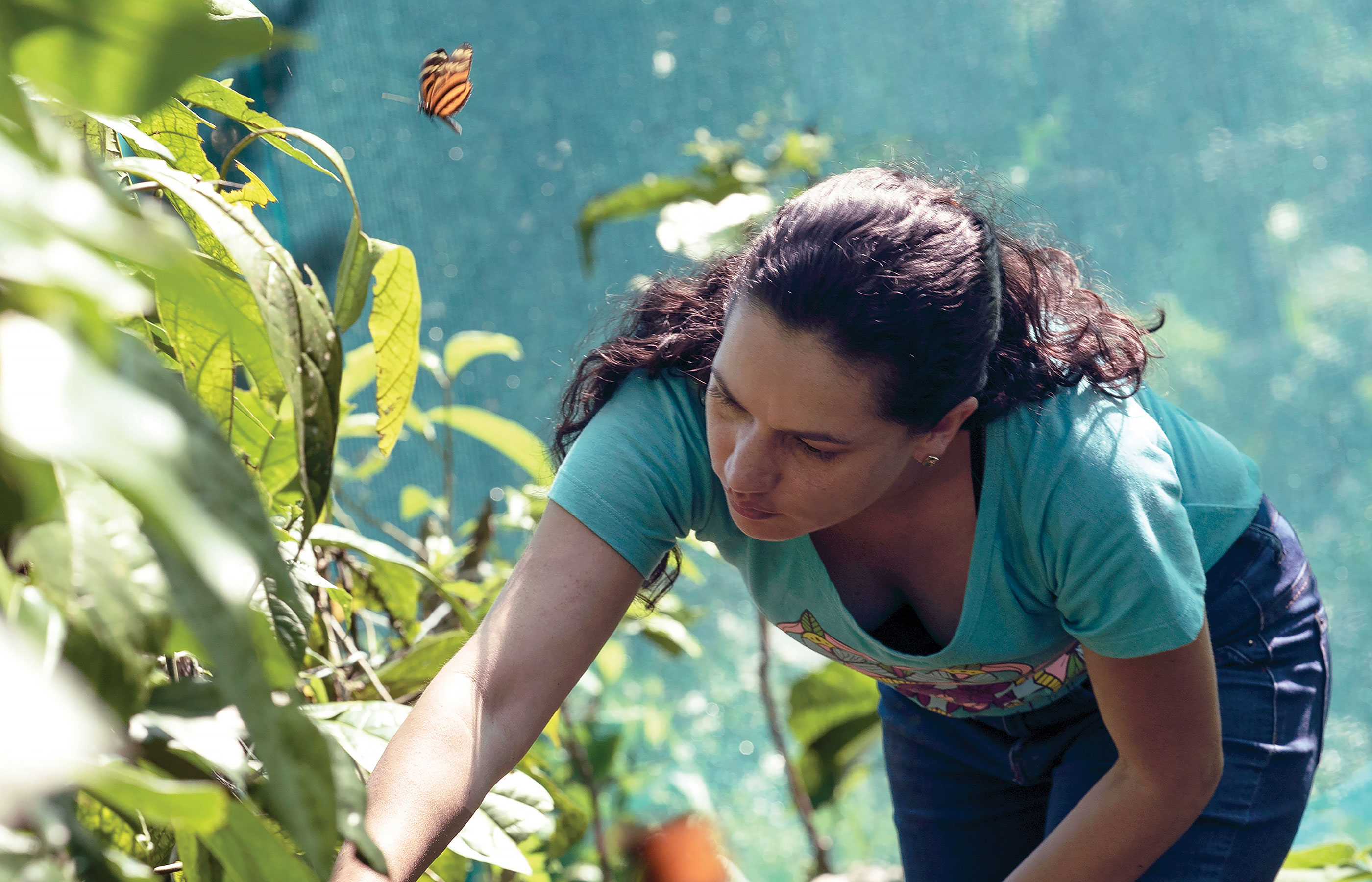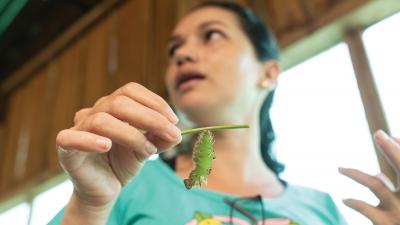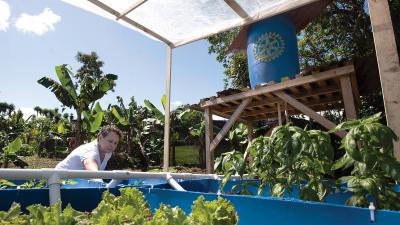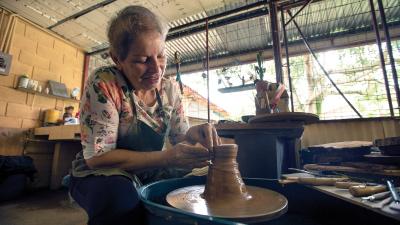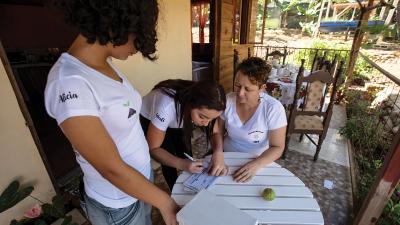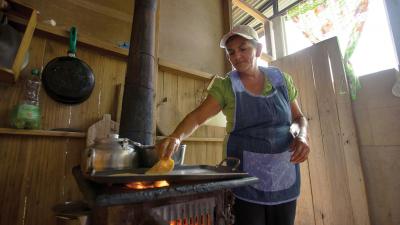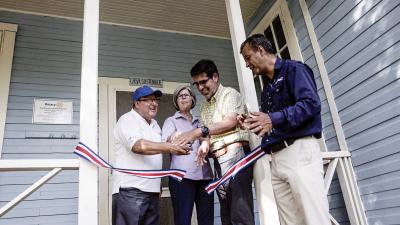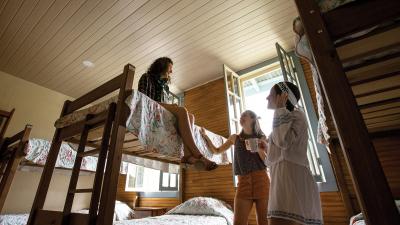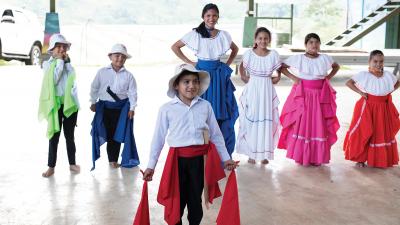With help from a Rotary Foundation global grant, a group of women in rural Costa Rica are using ecotourism to enrich their families’ futures
Drive east from the small city of Turrialba in the mountainous central region of Costa Rica, and after about an hour you will find yourself traveling down a bumpy gravel road. Cross a narrow bridge and you will find the even smaller town of Mollejones, which is where Karen and Evelyn García Fuentes grew up on a coffee farm. The farm belongs to their father, who had inherited the land from his grandfather.
When Karen and Evelyn were in their late teens, they left town and went to college. Moving to the city is the dream of many rural teenagers the world over. But after college, the sisters decided to return to Mollejones. Finding work close to home was difficult, but Karen had heard about a business in Costa Rica that raised butterflies for export. Karen set to work on learning what it would take to launch a similar enterprise. “We wanted our own project,” Evelyn says.
At the beginning, their father didn’t believe in the idea — and the butterflies terrified their mother. But Karen worked hard and focused on the business. Evelyn joined her, and their mother now works with them too. Another sister is handling the marketing and social media, and their father has given over more and more of his coffee farm to the butterflies. “The business has united the family,” Karen says.
The traditional perception of rural farmers is that their kids need to study so they can eventually leave. But the García sisters came back home. “We broke that cycle for our farm and our community,” Karen says.
The midmorning sun beats down on the García sisters as they smile and pose next to a colorfully painted sign that says Hogar de Mariposas: Home of the Butterflies. Karen McDaniels, a visitor from the United States, snaps their photo. “We’ll use these in your brochure, OK?” she says, before climbing a flight of earthen steps and walking a muddy path to see the butterfly sanctuary.
A member of the Rotary Club of Denton, Texas, McDaniels has come to Mollejones to inspect firsthand the impact of a Rotary Foundation global grant championed by her club in partnership with the Rotary Club of Cartago, Costa Rica. The grant has three components that address business training, aquaponics, and an eco-hotel. Among other things, the grant provides support for the García sisters and other local women who recently launched a tourism cooperative to attract visitors to experience the area’s rainforests, waterfalls, butterflies, and birds, as well as its traditional way of life. Rotarians partnered with the Tropical Agricultural Research and Higher Education Center; based in Turrialba, the organization, known as CATIE (pronounced “KAH-tee-ay”), has been working with the women for years.
At the sanctuary, hundreds of butterflies flutter about. Like a suitor trying too hard, they’re almost aggressively friendly, landing on visitors’ shoulders, hands, and bags. A gaudy orange and black butterfly even latches on to the lips of Eliécer Vargas, a professor of sustainable tourism at CATIE. “She fell in love with me!” he jokes as the butterfly gives him a kiss.
According to town leaders, until the late 20th century, Mollejones was a coffee and sugarcane town. But when commodity prices began to plummet two decades ago, half of its population left to find new ways to make a living. That’s when the idea for community-based tourism took root. The village lies near the Río Pacuare, where you will find some of the planet’s most celebrated whitewater rapids. In 2011, Mollejones hosted the World Rafting Championships, and the following year, a few of the residents went to CATIE for help strengthening their tourism industry. Soon after, Vargas and his students became involved.
Full of ideas, energy, and one-liners, Vargas is the primary conduit between the Rotarians and the women. He’s the perfect complement to the more reserved and no-nonsense McDaniels. Born in Saudi Arabia, McDaniels was educated in Switzerland and the United States. She spent most of her career working around the world for 3M; after retirement, she founded two nonprofits — one in Cambodia and another in Indonesia — to help the people she had met while living in those countries. When the children of the waste pickers she was working with in Indonesia grew sick from drinking tainted water, she struggled to find assistance for them. Someone suggested she contact a Rotary club there. The Rotary Club of Jakarta Cilandak stepped in, and McDaniels was hooked.
In 2017, McDaniels joined the Rotary Club of Denton, where she spearheaded the ecotourism global grant. Vargas, who had never worked with Rotary before, wasn’t sure what to expect. He didn’t even know if the Rotarians would follow through on their promises. “Then I met Karen,” he says. “She demands, and she delivers. She walks the talk. And after meeting the Rotary team, I realized that she pulls in people who want to make a difference.”
The Rotary Foundation global grant has three components that address business training, aquaponics, and an eco-hotel.
Angie Montoya Fernández’s father had been a coffee picker, but that’s a seasonal job. He didn’t want to travel to work in the capital city of San José, a couple of hours away, because he wanted to remain with his family. Instead, he and his wife learned English and became tour guides. “When I grew up, I wanted to be a tour guide too,” Montoya says.
As she talks, Montoya stands at the entryway to Guayabo National Monument, Costa Rica’s largest pre-Columbian archaeological site. A map of the landmark stands behind her, and to her side, the path to the ruins runs through a rainforest filled with ferns, vines, and epiphytes.
About 20,000 people visit the monument annually, and Montoya and her family are some of the freelance guides who show them around. To support other small, local entrepreneurs, Montoya’s mother, Rosa Fernández, had the idea to offer those visitors things to do while they’re in the area. Now, when people call to arrange a Guayabo tour, they also have an opportunity to book other options, such as a farm tour, lodging, or a cooking class. “I love the pre-Columbian history, but we need to move people to other places, too,” Montoya says.
That’s where the women’s tourism cooperative, called RETUS — Red de Emprendedoras del Turismo Sostenible de Turrialba, or Network of Women Entre-preneurs of Sustainable Tourism in Turrialba — comes into play. “The challenge for big tour operators is to trust a small tour operator or small provider,” Vargas says. “With RETUS, we hope this will give the local women a chance.”
The tourism cooperative got its start as an outreach project with Vargas’ graduate students at CATIE. “I wanted my students not just to read about sustainable tourism, but to do it,” Vargas says. He didn’t have money in his budget for outreach, but he could muster up some for research. So his students, who are studying at the center through a joint master’s program with the University of North Texas in Denton, began working with people who lived in the surrounding towns and villages. In Mollejones, for example, they held workshops where residents talked about what is unique about their community. The students transformed those conversations into experiential tour ideas that showcase the community’s heritage.
Vargas identified six women who were already working in tourism. “I call them the madrinas,” he says — the godmothers. These were women who may have been single mothers, or who raised a group of kids, or who learned English even though they had no education. Like Rosa Fernández (one of the madrinas), they went on to greater achievements and served as examples of what other women could accomplish.
Vargas told the madrinas that he wanted to help them form a tourism network, but it was up to them to choose the women who would be part of it. He told them to think of themselves as businesswomen and to envision what they wanted to happen in their communities and how they could help make that dream a reality. “I told them bring the women, but don’t tell them this is a project,” Vargas says. “Tell them this is a movement: ‘Don’t be a part of RETUS because you want to help yourself. Be a part of RETUS because you want to help women just like you.’” Three of the original madrinas decided they wanted to be involved, and they ended up with 18 women participating in some of the early phases of the tourism cooperative.
What those women were most eager to learn were business skills, things like administration, accounting, and marketing. Exactly the kinds of things Rotarians are experts in.
Marielos Salazar Cabezas slaps a ball of clay between her hands. Behind her, the muted tones of the buckets filled with mud contrast with the bright prism of paint bottles scattered throughout her pottery studio. A few times each year, Salazar heads into the nearby mountains to dig up soil that she strains and drains until the clay separates. The process can take up to a year before it’s the consistency she needs to craft the pots, bowls, piggy banks, Nativity scenes, and other unique artifacts that line her studio’s shelves.
Salazar met two of the madrinas at a craft fair, and they invited her to join the tourism cooperative. “I like the interaction,” she says. “I believe this is a great opportunity. We’ve got a lot of support.”
Some of that support came during the training workshops made possible by funding from the global grant; most of those classes were held in the boardroom on the third floor of CATIE’s administration building. During the financial portion of the training, Salazar learned how to calculate what she should be charging for her creations. Now, she starts with 2 kilos of clay and logs the time she spends working on a piece to determine the cost of her labor.
Salazar writes McDaniels a receipt after selling her some pottery. On the first day of class, all of the attendees had received a receipt book and a cost of goods sold financial sheet, among other things. “We explained the receipt book, how it works, and why it’s important,” McDaniels says. “Now they can get their clients’ names and contact information to follow up with them by email.”
The women in the cooperative had told McDaniels that they wanted to learn English, so each day of the workshops would begin with English games and exercises led by Cathy Henderson, a member of the Rotary Club of Denton-Lake Cities and a real estate agent who teaches English as a Second Language in Denton. “I’d have perfume samples, sprays, lip balm, and lotions for prizes,” Henderson recalls. And candy: A particular favorite was Life Savers mints. The women were paired up with Texas Rotarians to continue practicing over WhatsApp.
“These are phenomenal, hardworking women,” says Vanessa Ellison, a member of the Rotary Club of Denton Evening, who trained the women in marketing and social media. “They have a lot of cultural knowledge that would be attractive to tourists. We were simply there to help them put that out there.”
As McDaniels walks through the studio, Salazar tells her how the project benefited the women involved and the community. She can now afford to hire a woman to help clean twice a week, so now that woman has work too — and the benefits of the workshops and the global grant are evident elsewhere as well.
“The challenge for big tour operators is to trust a small tour operator or small provider. We hope this will give the local women a chance.”
When Vargas and his students conducted a sustainability assessment in Mollejones a few years ago, they discovered that the tourism projects themselves were sustainable except for one thing: People were feeding tilapia to the guests who had booked a meal. And the tilapia was coming from other countries. Vargas and his students looked into a local source for tilapia, but the work it entailed to transport the fish wasn’t feasible for the three or four fillets that hosts needed at a time.
Vargas had some experience with aquaponics — a system that combines raising fish with hydroponics, the science of growing plants in nutrient-enriched water — and he thought it might be the solution. He proposed the idea to the Rotarians, who included four aquaponics systems in the global grant, one for each of the three communities where they were working and a fourth at CATIE. Texas and Cartago Rotarians, as well as local volunteers, pitched in to construct the systems. “We were happy to get the opportunity to go into the rural communities in person and meet people and help them,” says Gloria Margarita Davila Calero, a Cartago Rotarian.
Given that it takes a fine balance between the number of fish and the number of plants to keep both alive, this phase of the project started small. “We want the technology to work,” Vargas says. “We don’t want to create false expectations.” The women in the cooperative were told that this was a research project, not a giveaway, and that they needed to sign on for one year to see if the system could be perfected. When that phase concludes later this year, the women could train other residents who might want a system of their own.
Brian Glenn, a retired fire battalion chief and the president-elect of the Denton-Lake Cities club, helped get this phase of the project started. He had become an expert in the science of water pressure and hoses during his career, and that knowledge translated well to the aquaponics systems. “It was on a different scale from what we used in the fire department, but the same hydraulic concepts apply,” he says. Plus Glenn knew how to swing a hammer from part-time jobs over the years, so that skill came in handy too. Once the variables are worked out, he says, Rotarians plan to make a kit with the materials needed to start an aquaponics garden, which Rotary clubs could then sponsor.
María Eugenia Brenes Araya received one of the pilot systems. At her home in Guayabo, she and her daughters Idali and Alicia are wearing matching shirts with the RETUS logo on the front and their names on the sleeves. The family offers a homestay, a cute two-bedroom unit at the back of their house. Guests can learn about the aquaponics garden and the family’s huerta, a traditional vegetable garden made of rows of mounded earth. In the front of the house, there is a permaculture garden, which takes a more localized, ecologically conscious approach to farming. “I started with a little idea, and when I went to the training with the Rotarians, I found I had other ideas to implement,” says Brenes, who is the cooperative’s treasurer.
Like mother, like daughter. Since they were already providing guests with somewhere to sleep, Idali, 18, had the idea to serve them a good meal. Now she’s thinking about starting a catering service and offering traditional gastronomic tours. Like the García sisters, she hopes that, rather than move to a distant city, she has found a way to stay close to home.
At a table overlooking the gardens, McDaniels, Vargas, and others sit down to one of Idali’s lunches. In the distance, the towering mountains provide a breathtaking backdrop. The meal, featuring produce from the family’s backyard, is equally spectacular. This could be the beginning of a brilliant career.
As she approaches a sky-blue house on the CATIE campus, McDaniels breaks into a grin. “It’s beautiful!” she exclaims. This was the first house built on the campus, in 1942, and since then, it has had various functions: employee housing, a Spanish school, student housing. But it had fallen into disrepair. Water leaked, and there were bats. “When I stayed here last year, you’d wake up with termite dust on you,” says Lynne Corvaglia, a student from Toronto who is the house’s resident manager.
Vargas had long dreamed of turning the dilapidated structure, which he calls the Sustainability House, into something more. In the early phase of Rotary’s involvement, McDaniels had stayed here as she toured nearby towns with the Cartago Rotarians. She saw an opportunity to rebuild and repurpose the house as an ecolodge for tour groups and as a place for RETUS members to meet and train, as well as welcome their guests. “Karen is like that,” Vargas says. “She’s a businessperson. She connects things.”
The Rotarians made renovating the Sustainability House the third component of their global grant. In July, Texas Rotarians and Interactors joined the Costa Rican Rotarians, RETUS, and local volunteers in a renovation blitz. Today, the high ceilings that had shed termite dust are repaired. Plywood was removed to reveal the original shiplap walls. Large open windows original to the house provide a view of the experimental gardens outside. The rewired house has high-speed Wi-Fi, an accessible bathroom, and an outdoor kitchen and patio lit with Christmas lights, and there are plans to hire someone to work from the house and promote the ecotours now being offered in nearby towns. “It’s going to help get clients for every single woman who works in RETUS,” says Marielos Salazar, the potter, who is also the group’s secretary. “This is a great opportunity, and we have to work together to make this grow.”
“The traditional model of maximizing profits has its limits in the communities we work in. We have to talk about social entrepreneurship.”
Marjorie Moya Ramírez, who has led the tour through Mollejones that began at the García sisters’ butterfly garden, now welcomes McDaniels and others to her family’s home. A veteran, with her sister Luisa, of Rotary’s three weeklong business workshops, Moya shows off the bags that she, her sister, and her mother sew and sell. Like the other women in the cooperative, Moya refers to her various enterprises as “projects,” a word that hints at the different way she and her associates view the economics of their situation. “When you talk to these women about money,” Vargas explains, “they say that, for them, it’s about their families and the needs of their community. The traditional model of maximizing profits has its limits in the communities we work in. We have to talk about social entrepreneurship.”
The day ends at the Mollejones community center with a traditional tico (that is, Costa Rican) meal of casado: rice, beans, meat, and salad. Some local children have joined the group, and one girl tells McDaniels about her plans to study tourism in college and then return home to pursue her career. As Karen García said earlier in the day, the cycle of sons and daughters eventually leaving this small town to search for work elsewhere has been broken.
After the meal, everyone holds hands and sits in a circle, singing a song about children helping children. As the sun sets behind the mountains, some of the girls rise and begin performing traditional dances. Their skirts swirl about them in a blaze of color, and the girls smile broadly, mariposas hermosas — beautiful butterflies — floating above a garden of song, their futures made brighter with a lift from Rotary.
• This story originally appeared in the May 2020 issue of The Rotarian magazine.
How to help
This project was supported by a Rotary Foundation global grant. Global grants support sustainable activities within Rotary’s areas of focus. Like this project, they are designed in cooperation with communities to address real needs.
When you make a donation to The Rotary Foundation, you can make lives better in your community and around the world.
Give at rotary.org/donate.
